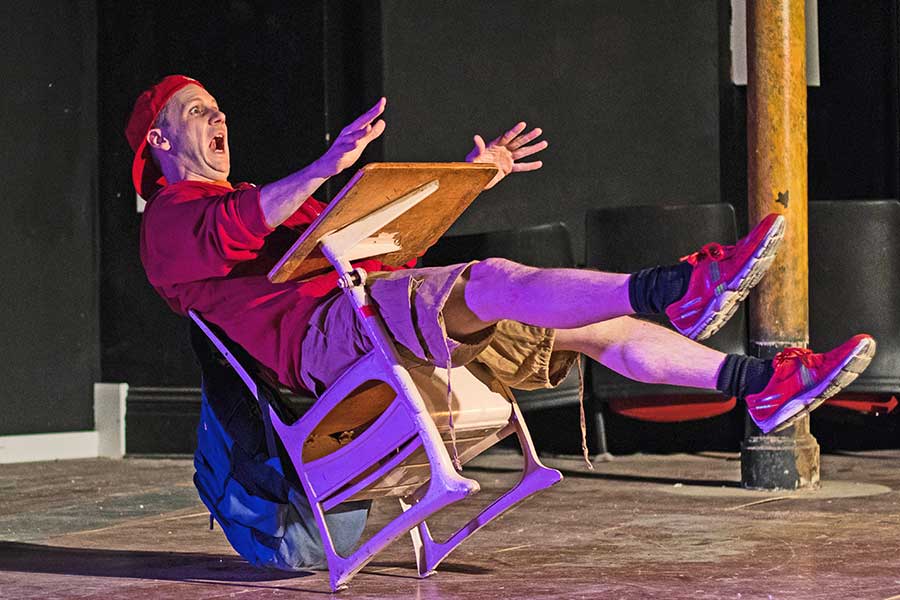Since 2003, Tribe of Fools has been Philly’s most breathlessly athletic and kinetic assayer of incendiary theater. The troupe has tackled tales of sexual identity, power dynamics, gender position, neighborhood politics and family. Going beyond movement and dance into karate and aerobics as an illustrative (often-violent) tool to make its radical point, the group — led by artistic director and board vice chair Terry Brennan — has touched on everything from questions of machismo in South Philadelphia (2011’s “Heavy Metal Dance Fag”) to gay Mummers (2014’s “Two Street”), all for FringeArts. Now with gay director Jack Tamburri, Brennan tackles his first one-man Tribe show and first non-Fringe gig in “School Play.”
We spoke with the actor and the director about the comedy, which concerns a child with ADHD who is unable to sit still through the slop that is our educational system.
PGN: What is each of your take on the Tribe of Fools aesthetic?
TB: For me, it’s about doing things physically that most audience members realize they wouldn’t be able to do. I like stuff that’s splashy and maybe a little bit trashy. Thematically, I try to subvert traditional narrative.
JT: I was impressed by Tribe of Fools’ alchemy of progressive politics, sitcom narrative mode and physical spectacle. My impression is that the heart of Tribe of Fools is using dynamic physical spectacle to discuss relevant issues in social politics in an inviting, sitcom-y mode. This recipe is pretty damn winning, the best way anyone in American theater has found to potentially engage “the other side” (i.e., people who traditionally espouse socially conservative politics) meaningfully and respectfully.
PGN: Several Tribe shows touch heavily and humorously on LGBT issues. Jack, as a gay man, how do you feel that Terry has handled this? And Terry, as a straight man, how did you go about being sensitive while touching on LGBT issues (you seem to play up the stereotypes of South Philly men and women, while making certain gay characters have no stereotypical behavior)?
TB: Because I’m a transplant to Philly, I’m fascinated with the different neighborhoods, especially South Philly. Whenever we punched up that stereotype, it has been to work against them. As far as LGBTQ themes and portrayals go, we’ve always been big believers in simply presenting gay characters. For example, in “Zombies … with Guns,” we made the antagonist gay, but we only mentioned it twice. I will say that as a straight man, I worry a lot about presenting potential empty stereotypes of gay characters so I often shy away from using them. When I’ve had gay actors (like in “Two Street”), I’ll let them play stuff like that up if it’s their idea, but I don’t ever suggest it.
JT: I was not around for “Heavy Metal Dance Fag”; I’ve heard it was a pinnacle of the Tribe of Fools recipe. I was impressed by “Two Street.” I thought it was written and performed with sensitivity (given that the comic mode was, essentially, “Loony Tunes”). The boundaries around creating work about oppressed groups are fascinating: Who gets to tell whose stories and how? Representation is incredibly important, and authorship over one’s own narratives is the best way to ensure authenticity. That said, I think Terry has been really smart in exactly the way you describe: I would feel comfortable creating a piece of comic business that relied on a “gay” stereotype because I trust myself to stage the truth that belies the stereotype or calls it out — that punches up at hetero-patriarchy rather than making the stereotype itself the butt of a joke. I think it’s the right move for Terry to navigate around those sorts of jokes and instead make the jokes that he can authentically get behind as a decade-long resident of South Philly. I think it’s important to point out that he cast out gay performers in the gay roles, at least in “Two Street,” which contributes to the authenticity of that production in an important way.
PGN: What localness are you bringing to “School Play”?
TB: My character wears a Phillies hat. This story is more universal and deals with the powerlessness of kids in school. I hated school so much that summer is still my favorite time of year … even though a typical summer day is 12-15 hours of straight work and kind of miserable.
PGN: Why do you think that you two work well together on “School Play”?
JT: Paradoxically, our experiences of school were direct opposites. I was the kid who thrived within the assigned structures and received endless validation from teachers and grades. Our senses of humor are similarly range-y: We love fart jokes and complicated language-play equally, and we’re invested in the science of comedy, in finding the language and rhythm and expression that land the laugh every time.
“School Play” runs through June 25 at St Peter’s School, 319 Lombard St. For more information, visit www.tribeoffools.org.

